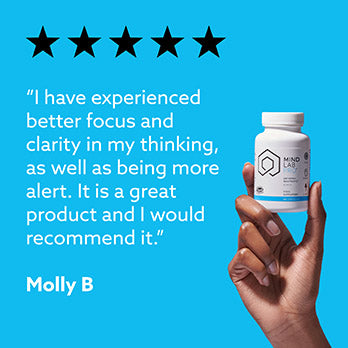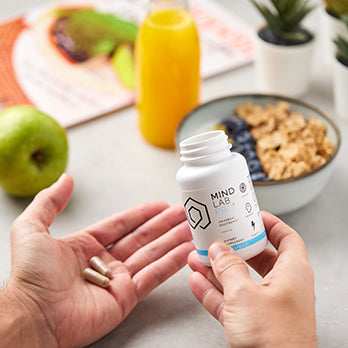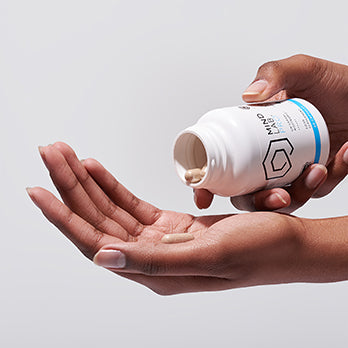Attention is key for peak cognitive performance. But with our senses bombarded 24/7 by media, notifications and various digital devices, it is harder than ever to maintain attention in 2018. Some nootropics for attention may help.
A natural pathway to sharp, sustained attention, nootropics are increasingly used as an alternative to stimulant-driven synthetics. This guide discusses the best of these nootropics for attention, and how one advanced stack combines them for superior attention-enhancing results.
Inattention: A Widespread Cognitive Concern
While nootropics improve memory, mood, energy, neuroprotection, neuroregeneration, and more, many nootropic users turn to nootropics for one thing: better attention spans.
This popular use of natural brain-boosters reflects the increasing prevalence of doctor-diagnosed attention problems like ADHD.
- According to one meta-analysis of 175 different studies, about 10% of children have some kind of attention disorder -- up from a rate of about 7% in 1999.
In the professional and academic arenas, inattention may induce a series of negative outcomes -- e.g., a distracted listener is prone to missing due dates, mucking up assignments and important meetings, diminished ability for studying, and potential for intense stress responses that further worsen a poor attention span.
Poor attention span may seem like a fleeting issue, but it can hold back peak cognition and have a far-ranging negative effect on overall life performance.
What Causes Inattention?
The release and uptake of the neurotransmitter dopamine is important for peak attentional performance.
Boredom? Food additives? Lack of discipline? Social media? While the list of correlative suspects increases, researchers consistently focus on The Catecholamine Hypothesis as a possible cause of inattention.
The Catecholamine Hypothesis
According to the Catecholamine Hypothesis, affective disorders, such as inattention and hyperactivity, may be linked to an imbalance in brain chemicals known as catecholamines.<1>
In simple terms, catecholamines are neurotransmitters partially responsible for regulating "excitatory" neuronal activity -- the "high activity" bodily state -- although some catecholamines may conditionally operate as an excitatory or inhibitory ("low activity") neurotransmitters, e.g., dopamine.
The neurotransmitters emphasized by the Catecholamine Hypothesis include:
- Norepinephrine - Or noradrenaline, the "attention" chemical; associated with sleep-wake cycle regulation, peaking during states of stress or activity.
- Epinephrine - Or adrenaline, the "fight or flight" chemical; increases blood flow to muscles, heart rate, and blood sugar levels.
- Dopamine - The "motivation" molecule; facilitates reward-seeking behavior, supports the anterior brain's executive attention ability.<2>
Many of today's therapies for poor attention span -- ranging from synthetic stimulants to natural nootropics -- are designed to balance these catecholamine brain chemicals.
Stimulants for Inattention
Stimulant use is now widespread. Smart drugs available by prescription are by far the most popular pills for enhancing attention. Caffeine counts as another stimulant that is often over-used in the quest for sharper attention.
As detailed in the 2018 Netflix documentary Take Your Pills, synthetic stimulants are now widely used to improve attention across many demographics. College students, professionals, athletes artists and more have improved their productivity by taking these smart drugs.
- Synthetic stimulants temporarily "correct" inattention and hyperactivity by flushing the brain with catecholaminergic brain chemicals, providing a reliable, fast-acting boost on focus, attention, and energy.
As effective as stimulants may be for improving attention, they are not the right choice for everybody -- especially when it comes to long-term usage.
Possible Stimulant Drawbacks
The true benefits of stimulants for attention are often short-lived, followed by a reliable, fast-acting crash. Some stimulant benefits may even degenerate into harsh, long-term side effects when engaged too frequently.
- An excess of synthetic catecholaminergic stimulation short-circuits and atrophies the brain's natural catecholaminergic structures, which may sacrifice healthy attention and proper cognitive function for harsh, short-term jolts of focus.
Stimulant limitations partly explain why so many brain bio-hackers have turned to natural nootropics for attention -- including smartly designed stack supplemets like Mind Lab Pro®, the world’s first Universal Nootropic™.
Mind Lab Pro® Nootropics for Attention
Nootropics may provide a healthier alternative to stimulants, boosting attention and focus by optimizing the brain's natural pathways.
The nootropic option doesn't substitute but rather optimizes catecholamine bio-pathways, assisting the brain's natural capacity to synthesize, convert and utilize catecholamine brain chemicals. As a result, nootropics can help us to pay attention and focus without the short- and long-term cognitive crash.
- The goal of superior quality nootropic stacks: Help make the brain a powerful thinking machine, firing on all cylinders, at no risk to future brain health.
Does this make nootropics a perfect, parallel swap for synthetic stimulants? No. But that's okay.
Unnatural synthetics may achieve unnaturally high psychostimulatory output, however the synthetics' consequent detriment to "normal" cognition makes abnormal the new normal, potentially increasing risk of issues related to side effects and addiction.
The point to supplementing with natural nootropics for attention is to achieve safe, sustainable, natural cognitive enhancement.
Granted, not all nootropics engage the catecholaminergic pathways to better attention, focus, and energy, but those that do may raise the cognitive standard to a higher functional threshold, opening other mental doors to improved learning, memory, mood, and more.
Additional nootropics may enhance attention via brain pathways that are unrelated to catecholamines. By stacking together nootropics that improve attention from many different angles, superior mental performance results may be realized.
Some of the best nootropics for attention found in Mind Lab Pro® include:
Citicoline
Citicoline as Cognizin® is a premium-quality nootropic with well-designed studies demonstrating benefits for attentional performance.
Citicoline is Mind Lab Pro®'s flagship mental performance-enhancer. Its research-backed benefits for brain energy production, brain cell membrane formation and other brain functions appear to produce a wide range of cognitive benefits -- including for attention.
- Citicoline has been shown in human research to enhance attentional performance, improve attentional deficits and reduce impulsivity in study subjects ranging from middle-aged women to adolescent males.<3,4>
The best research-backed Citicoline benefits for attention have been demonstrated with Cognizin®, a patented form of the nootropic found in Mind Lab Pro®:

While Cognizin® Citicoline's exact mechanisms of action for enhancing attention have not yet been pinpointed, it is suggested to raise the catecholamine brain chemical acetylcholine.
This beneficial effect, combined with Citicoline's whole-brain optimizing activity, helps sharpen focus while nourishing and enhancing overall brain health.
More on Mind Lab Pro® Cognizin® Citicoline
Maritime Pine Bark Extract
Nootropic Maritime Pine Bark Extract enhances antioxidant status, cerebral circulation, and brain regeneration for research-backed reductions in hyperactivity and inattention.
The maritime pine (Pinus pinaster) tree possesses a rich, complex array of antioxidant flavonoids called proanthocyanidins -- commonly referred to as oligomeric proanthocyanidin complexes (OPC) -- that protect the tree against harsh coastal climes as much as they enhance human cognitive function.
- Found in red wine, cocoa, currants, berries, and other herbal extracts, maritime pine bark's OPCs have become a popular source of health-promoting antioxidants, possessing an antioxidant potential that's 20x greater than that of vitamin E and 50x greater than that of vitamin C.<5>
Despite centuries of use, maritime pine bark only recently garnered respect as a bona fide nootropic, with more and more research identifying a reliable increase in concentration and attention with pine bark extract supplementation.
Based on one study in particular (on young men with deficit disorder), maritime pine bark extract may benefit cognition by:
- Helping with hyperactivity and ADHD
- Improving attention
- Enhancing visual-motoric coordination and concentration.<6>
As further evidence for the Catecholamine Hypothesis, researchers observed a significant decrease in the urinary excretion of dopamine, norepinephrine, and epinephrine with Maritime Pine Bark Extract administration.
Conversely, a relapse in poor attention spans and concentration was observed following one month of terminated maritime pine bark extract supplementation, suggesting OPC's long-lasting bio-benefits.
More on Mind Lab Pro® Maritime Pine Bark Extract
N-Acetyl L-Tyrosine
Naturally found in high protein food products, L-tyrosine potentially bolsters an attention span harried by stress and over-activity via catecholamine conversion.
As a cognitive enhancer, N-Acetyl-L-Tyrosine works best under pressure. To maintain high levels of cognition, the over-stressed and over-worked brain burns through catecholamine neurotransmitters, depleting the body's natural tyrosine reserves. And when the tyrosine runs dry...
The brain shuts off, and there goes your thought processes.
Due to L-tyrosine's reliable conversion to catecholamines, supplementing L-tyrosine in its enhanced, bio-active form, N-Acetyl-L-Tyrosine, may help to ameliorate stress-induced catecholamine depletion, restoring and sustaining focus, attention, mood, and energy when mental performance matters most.<8>
Associating inattention with stress and over-exertion involves no stretch of the imagination. In fact, this tends to be a common complaint by those who are stressed or over-worked: "I can no longer pay attention."
While N-Acetyl-L-Tyrosine seemed to earn its nootropic popularity for its mood and motivation benefits, research and review studies suggest the amino may benefit cognition under the following conditions:
- Sleep deprivation - Found to counteract mental performance decrements associated with extended wakefulness, i.e., all-nighters.<9>
- Audio distraction - Tyrosine may improve performance on stress-sensitive tasks while exposed to a stressor of 90 dB noise.<10>
- Multi-tasking demands - Demonstrated to improve working memory amidst competing requirements to perform other tasks.<11>
On-the-spot attentional needs otherwise diminished by stress, distractions, and hard-to-focus conditions may be boosted by on-the-spot tyrosine supplementation. Best taken under high-competitive, high-performance conditions.
More on Mind Lab Pro® N-Acetyl L-Tyrosine
Phosphatidylserine (PS)
A brain cell membrane component and a key phospholipid throughout the body, phosphatidylserine supports overall cognition, including attention.
Backed by numerous clinical reviews, phosphatidylserine (PS) isn't simply a cognitive enhancing supplement ingredient. It's a cognition forming compound, operating as one of the key building blocks to the phospholipid bilayer of the cell membrane.
As a building block compound, PS supports good neuronal health and integrity by:
- Maintaining brain cell membrane fluidity and permeability.
- Supplying raw material for neurogenesis and neuro repair.<12>
At the basic, biological level, PS partially establishes and maintains healthy neural connectivity, promoting myelin sheath stability for effective neurotransmissions.
 Phosphatidylserine helps form the phospholipid bilayer that comprises brain cell membranes. By OpenStax <CC BY 4.0>, via Wikimedia Commons
Phosphatidylserine helps form the phospholipid bilayer that comprises brain cell membranes. By OpenStax <CC BY 4.0>, via Wikimedia Commons
- PS for Inattention: Children aged 4 to 14 were administered either 200 mg PS or placebo daily for two months, during which tests were performed to gauge any changes in attention performance, short-term auditory memory and working memory, and visual mental performance. The study found PS to significantly improve attention and auditory memory over placebo, qualifying PS as a safe and natural nutritional strategy for improving mental performance afflicted by inattention and hyperactivity.<14>
Beyond its potential for attention enhancement, PS qualifies as one of few nootropics that may reliably improve cognition from early childhood to old age, providing acute cognitive enhancement benefits that potentially extend for a lifetime. Stacking the nootropic with fish oil supplements may further enhance its efficacy.<15>
More on Mind Lab Pro® Phosphatidylersine
L-Theanine
This green tea-sourced nootropic may enhance attention by tuning Alpha brain waves to a state of calm mental clarity.
L-Theanine is famously known for raising activity of Alpha brainwaves to promote "wakeful relaxation" -- a calm-yet-alert mental state associated with creative thinking, quiet contemplation and peak productivity. This unique amino acid nootropic's brain-beneficial activity appears well-suited for enhancing attention, and is backed by research suggesting as much:
- In human clinical research, L-Theanine has been shown to have a role in attentional processing. Researchers suggested that supplementing with L-Theanine appeared to support longer-range cognitive processes associated with sustaining sharp attention during difficult, lengthy mental tasks.<16>
In addition to its apparent direct support for attention, L-Theanine has anti-stress benefits and sleep-enhancing activity that fosters peak overall cognition, including concentration, focus and attention.
More on Mind Lab Pro® L-Theanine
Mind Lab Pro® B-Vitamins: Essential brain chemical support for attention
Additional Mind Lab Pro® nootropics include a trio of B Vitamins - Vitamins B6, B9 and B12 -- that facilitate brain chemical syntheses and conversions. These nootropic essentials also help L-tyrosine's conversion to L-DOPA, thereby optimizing a key brain function for attention-related neurotransmitters.<17>
Vitamins B6, B9 and B12 as BioGenesis™
Mind Lab Pro® underwent a formula upgrade in 2017 to add Vitamins B6, B9, and B12 as BioGenesis™ Nature-Identical.
These three B-vitamins have been shown in research to help regulate high homocysteine levels, which have been linked to brain circulation problems and increased risk of cognitive decline.
BioGenesis™ is an eco-friendly, lab-grown form of these nootropic B-vitamins. BioGenesis™ is complexed with whole-food cofactors that enhance nutrient absorption -- maximizing the B-Vitamins' nootropic support for attention-related brain chemicals.
More on Mind Lab Pro® Vitamin B6
Conclusion
Mind Lab Pro® supplies the best nootropics for attention in a clean, safe and stim-free formula that enhances overall brain health.
Whereas typical cognitive enhancers for inattention and hyperactivity (like Adderall, caffeine and others) may boost attention but have crashes and side effects, natural nootropics improve attention by improving brain health.
- The side effects to the nootropic route only include other positive cognitive outcomes, such as enhanced memory, mood, and energy.
Stacked with an appropriate sleep and exercise routine, alongside a healthy diet and meditative schedule, these nootropics may calm your cognition, removing the mental distractions to keep your mind pure and focused on the prize.
References
- Schildkraut JJ. The Catecholamine Hypothesis of Affective Disorders: A Review of Supporting Evidence. Am J Psychiatry. 1965 Nov; 122(5): 509-22.
- Bush G. Attention-Deficit/Hyperactivity Disorder and Attention Networks. Neuropsychopharmacology. 2010 Jan; 35(1): 278-300.
- McGlade E. et al., Improved Attentional Performance Following Citicoline Administration in Healthy Adult Women Food and Nutrition Sciences. 2012;3:769-773.
- McGlade E, et al. The Effect of Citicoline Supplementation on Motor Speed and Attention in Adolescent Males. J Atten Disord. 2015 Jul 15.
- Shi J et al. Polyphenolics in grape seeds-biochemistry and functionality. J Med Food. 2003 Winter; 6(4): 291-9.
- Trebatická J et al. Treatment of ADHD with French maritime pine bark extract, Pycnogenol. Eur Child Adolesc Psychiatry. 2006 Sep; 15(6): 329-35.*
- Vauzour D et al. The neuroprotective potential of flavonoids: a multiplicity of effects. Genes Nutr. 2008 Dec; 3(3-4): 115-126.
- Fernstrom JD, Fernstrom MH. Tyrosine, phenylalanine, and catecholamine synthesis and function in the brain. J Nutr. 2007 Jun; 137(6 Suppl 1): 1539S-1547S; discussion 1548S.
- Neri DF et al. The effects of tyrosine on cognitive performance during extended wakefulness. Aviat Space Environ Med. 1995 Apr; 66(4): 313-9.
- Deijen JB, Orlebeke JF. Effect of tyrosine on cognitive function and blood pressure under stress. Brain Res Bull. 1994; 33(3): 319-23.
- Thomas JR et al. Tyrosine improves working memory in a multitasking environment. Pharmacol Biochem Behav. 1999 Nov; 64(3): 495-500.
- Glade MJ, Smith K. Phosphatidylserine and the human brain. Nutrition. 2015 Jun; 31(6): 781-6.
- Kingsley MI et al. Effects of phosphatidylserine on exercise capacity during cycling in active males. Med Sci Sports Exerc. 2006 Jan; 38(1): 64-71.
- Hirayama S et al. The effect of phosphatidylserine administration on memory and symptoms of attention deficient hyperactivity disorder: a randomised, double-blind, placebo-controlled clinical trial. J Hum Nutr Diet. 2014 Apr; 27 Suppl 2: 284-91.
- Manor I et al. The effect of phosphatidylserine containing Omega3 fatty-acids on attention deficit hyperactivity disorder symptoms in children: a double-blind placebo-controlled trial, followed by an open-label extension. Eur Psychiatry. 2012 Jul; 27(5): 335-42.
- Manuel Gomez-Ramirez, et al. The Effects of L-theanine on Alpha-Band Oscillatory Brain Activity During a Visuo-Spatial Attention Task. Brain Topogr (2009) 22:44–51
- Yarlagadda A, Clayton AH. Blood Brain Barrier – The Role of Pyridoxine. Psychiatry (Edgmont). 2007 Aug; 4(8): 58–60.
* Please note that many Pine Bark Extract studies include data and citations which are specific to Pycnogenol®, which is not an ingredient of Mind Lab Pro®.



































